
Article by Karsten Hoffmeyer. Updated on August 20, 2025
Best MediaWiki Extensions in 2025
There are thousands of extensions available for MediaWiki, so it can be tough to know which ones are the most useful. To help you out, we've compiled a list of the 20 most useful MediaWiki extensions.
Building on our popular 2023 guide, we've expanded and enhanced our analysis of MediaWiki extensions. We consider three key aspects:
-
Functionality:
How well the extension enhances your wiki through crucial features. -
Usability:
How easily users can implement and benefit from the features. -
Sustainability:
Long-term viability, including maintenance and compatibility.
This guide helps you choose the right extensions for your MediaWiki site. Discover the top 20 MediaWiki extensions.
Table of Contents
What is a MediaWiki Extension?
You should check out MediaWiki extensions if you've ever wanted your wiki to do more, like highlight code sections or show interactive maps. Extensions enhance your wiki by bringing in new features or enriching existing ones, such as structured data handling, data exchange, rich text editing, and spam prevention. While some people call them "plugins" or "add-ons," the MediaWiki community refers to them as "extensions" because they extend your wiki into a genuine knowledge base with additional capabilities. Extensions are similar to WordPress plugins.
How Are They Added?
Someone with server access needs to install and
configure MediaWiki extensions directly on the server. This approach distinguishes MediaWiki
from other software, where users can typically manage add-ons through a web interface. Note
that managed hosting with ProWiki works differently - you can enable and configure
extensions via their Admin Panel.
Top 20 MediaWiki Extensions
All extensions included in our top list are free and compatible with versions from MediaWiki 1.35 to MediaWiki 1.43. They are also expected to support many upcoming MediaWiki releases.
#20: CodeMirror
The CodeMirror extension enhances wiki editing by providing real-time syntax highlighting for wikitext. It instantly flags syntax errors like unclosed brackets and tags, helping editors catch mistakes as they work. Recent improvements make it valuable for wiki editors at all skill levels.
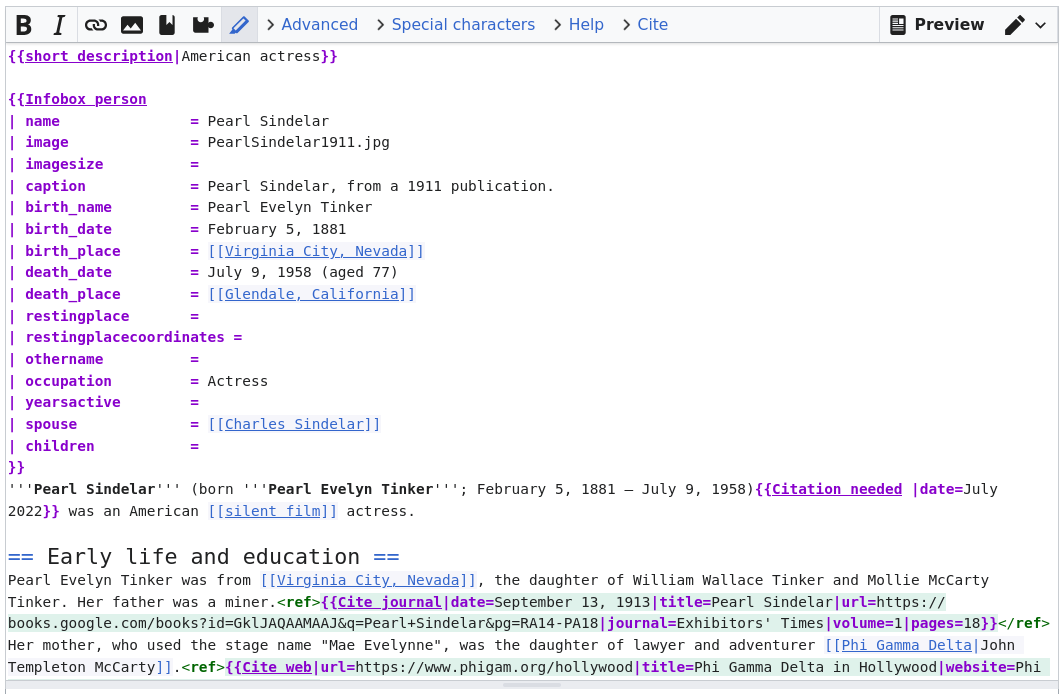
| Categories: User interface (UI), Editing | |
| Bundled with MediaWiki | |
|---|---|
| Available in ProWiki | |
| Used by Wikimedia | |
#19: OATHAuth
The OATHAuth extension adds two-factor authentication (2FA) to wiki platforms, integrating with standard authenticator apps like Authy. Administrators can make 2FA optional or mandatory for specific user groups, improving account security and user accountability across the wiki platform.
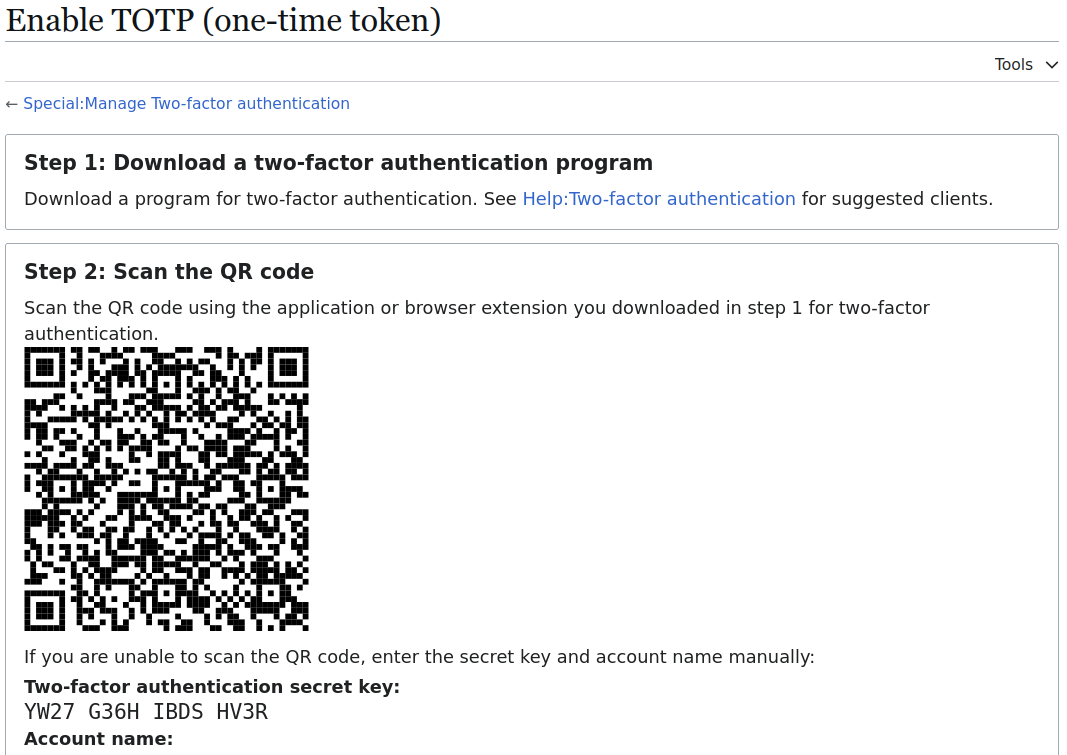
| Categories: Security | |
| Bundled with MediaWiki | |
|---|---|
| Available in ProWiki | |
| Used by Wikimedia | |
#18: CategoryTree
CategoryTree is an extension that lets users explore wiki category hierarchies through an interactive tree interface. Users can expand/collapse categories to see their subcategories and contents.
It visualizes the category namespace structure, making browsing and understanding how content is organized within the wiki easier.
| Categories: User interface (UI), Browsing | |
| Bundled with MediaWiki | |
|---|---|
| Available in ProWiki | |
| Used by Wikimedia | |
#17: InputBox
The InputBox extension adds customizable form fields to wiki pages. It provides a simple way to create text input forms for searching, making new pages, moving content, or adding comments.
This extension streamlines everyday wiki actions through an accessible interface.
| Categories: User interface (UI), Editing, Searching | |
| Bundled with MediaWiki | |
|---|---|
| Available in ProWiki | |
| Used by Wikimedia | |
#16: MsUpload
MsUpload is an extension that lets wiki users upload several files simultaneously instead of doing them one at a time. It is a drag-and-drop tool where you can select multiple files from your computer and upload them to the wiki in one go. It's pretty straightforward - pick your files, and upload them all together.

| Categories: User interface (UI), Media handling | |
| Bundled with MediaWiki | |
|---|---|
| Available in ProWiki | |
| Used by Wikimedia | |
#15: TemplateData
TemplateData helps wiki editors work with templates by adding structured documentation. It shows what parameters a template uses, what they do, and how to fill them in. Think of it as a built-in manual that pops up when you're editing - it tells you exactly what information the template needs and how to use it properly.
When you're editing with the VisualEditor, it even gives you a nice form to fill in instead of having to remember all the parameter names as a light-weight alterntive to Page Forms.
| Categories: User interface (UI), Editing, Data management | |
| Bundled with MediaWiki | |
|---|---|
| Available in ProWiki | |
| Used by Wikimedia | |
#14: MultimediaViewer
The MultimediaViewer makes looking at images on wikis more user-friendly. When you click an image thumbnail, instead of going to the file page, it opens the image in a sleek fullscreen view on the same page. You can flip through multiple images, read captions and metadata, and download files without leaving your current page. It turns wiki images into a smooth gallery experience.
Suppose you are using Wikimedia Commons as a foreign file repository on your wiki by utilizing the so-called InstantCommons feature, we recommend also adding the CommonsMetadata extension, which helps you extract and use the respective file metadata on your local wiki.
| Categories: Media handling | |
| Bundled with MediaWiki | |
|---|---|
| Available in ProWiki | |
| Used by Wikimedia | |
#13: EmbedVideo
The EmbedVideo extension enables you to embed videos directly into wiki pages. It supports popular services like YouTube, Spotify, Twitch, SoundCloud, and Vimeo, as well as other major platforms and locally uploaded video files (mp4).
| Categories: Media handling | |
| Bundled with MediaWiki | |
|---|---|
| Available in ProWiki | |
| Used by Wikimedia | |
#12: WikiSEO
WikiSEO is an extension extension that helps improve your wiki's visibility for search engines, generally called search engine optimization (SEO). It lets you customize how your wiki pages appear in search results by adding meta elements (aka meta tags), modifying page titles, setting descriptions, and other helpful information, including social media-related details. You can influence what shows up when people share your pages on social media, making your wiki content more visible and attractive.
If you are using Semantic MediaWiki, look at the Semantic Meta Tags extension, which serves the same purpose and integrates with it.
| Categories: Searching, Data visibility | |
| Bundled with MediaWiki | |
|---|---|
| Available in ProWiki | |
| Used by Wikimedia | |
#11: Data Transfer
The Data Transfer extension is a practical tool to import data from CSV or spreadsheet files into your wiki. The import works by mapping the file content to templates and their parameters. Wiki pages are created automatically, and you can choose to do a full or partial import.
Data Transfer is an excellent tool for creating and updating structured data. This way it works well together with Semantic MediaWiki.
| Categories: Data management | |
| Bundled with MediaWiki | |
|---|---|
| Available in ProWiki | |
| Used by Wikimedia | |
#10: Maps
Maps is the MediaWiki extension to visualize and work with geographical information. You can embed beautiful dynamic maps using either Leaflet or Google Maps.

The maps are highly customizable. Specify markers, lines, and polygons to show. Or choose the map layers, clustering options or the map's dimensions. Dozens of options give you an immense amount of control over the look and feel of the map, and it's behavior.
Maps comes with a visual map editor and GeoJSON support. It also provides parser functions for geocoding, coordinate formatting, and geospatial operations. Last but not least, it integrates with Semantic MediaWiki, enabling you to build maps from queried data.
| Categories: Data visualization, Data management | |
| Bundled with MediaWiki | |
|---|---|
| Available in ProWiki | |
| Used by Wikimedia | |
#9: Gadgets
The Gadgets extension lets wiki administrators add custom JavaScript and CSS tools (called gadgets). Wiki users can enable these scripts according to their preferences. These gadgets can add new features or modify how the wiki works. The changes range from simple styling tweaks to more or less complex editing tools. Users can choose which gadgets to use, making their wiki experience more customizable and enjoyable than without them.
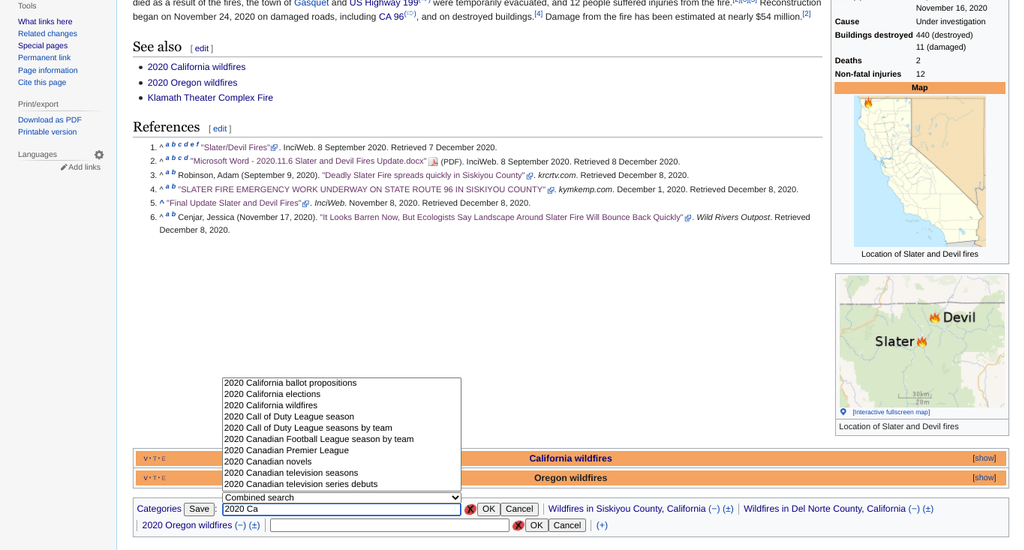
| Categories: User interface (UI), Scripting, Editing | |
| Bundled with MediaWiki | |
|---|---|
| Available in ProWiki | |
| Used by Wikimedia | |
#8: Cite
The Cite extension adds citation support to your wiki. It provides tools for managing references, including footnotes and reference lists. You can add inline citations and generate organized reference lists. It also handles single and grouped references appearing multiple times on a page.
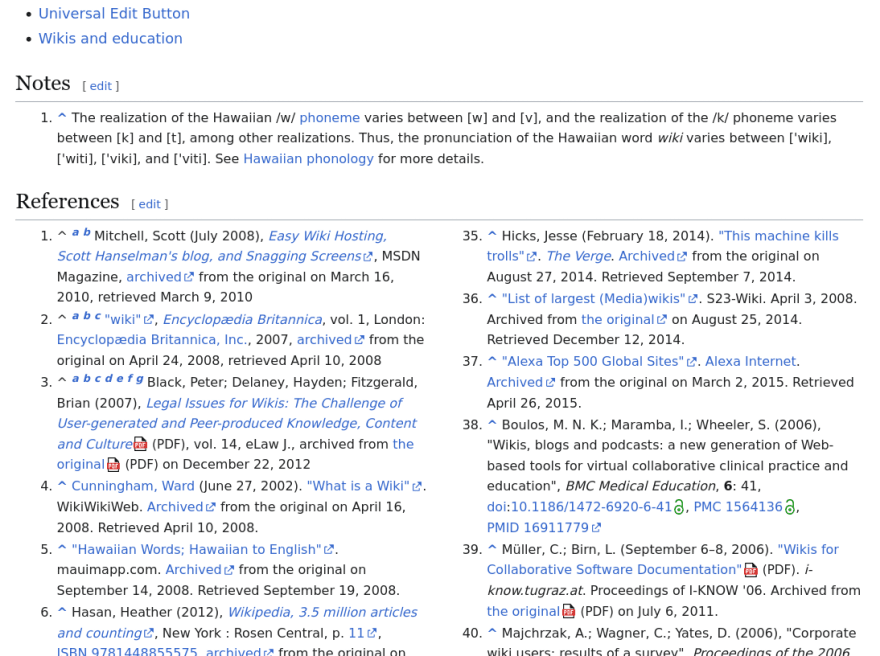
Wikis always benefit from strong citation support. Citations ensure accountability, transparency, and attribution while enhancing the reliability, accuracy, and trustworthiness of your wiki's content. Additionally, the extension allows you to add comments when needed.
| Categories: User interface (UI), Data management | |
| Bundled with MediaWiki | |
|---|---|
| Available in ProWiki | |
| Used by Wikimedia | |
#7: External Data
The External Data extension lets you fetch and display data from external sources on your wiki pages. It can pull content from URLs, files, databases, and APIs and then format that data in your wiki. You can use it to automatically update information from external sources, create dynamic lists, or integrate data from other systems into your wiki.
All the external data are used best in connection with Semantic MediaWiki on your wiki.
| Categories: Data Management | |
| Bundled with MediaWiki | |
|---|---|
| Available in ProWiki | |
| Used by Wikimedia | |
#6: Replace Text
The Replace Text extension provides a powerful tool for find-and-replace editing of strings within pages. Additionally, you can move pages via text replacements within their titles. Replace Text provides a concise interface with many options for wiki administrators.
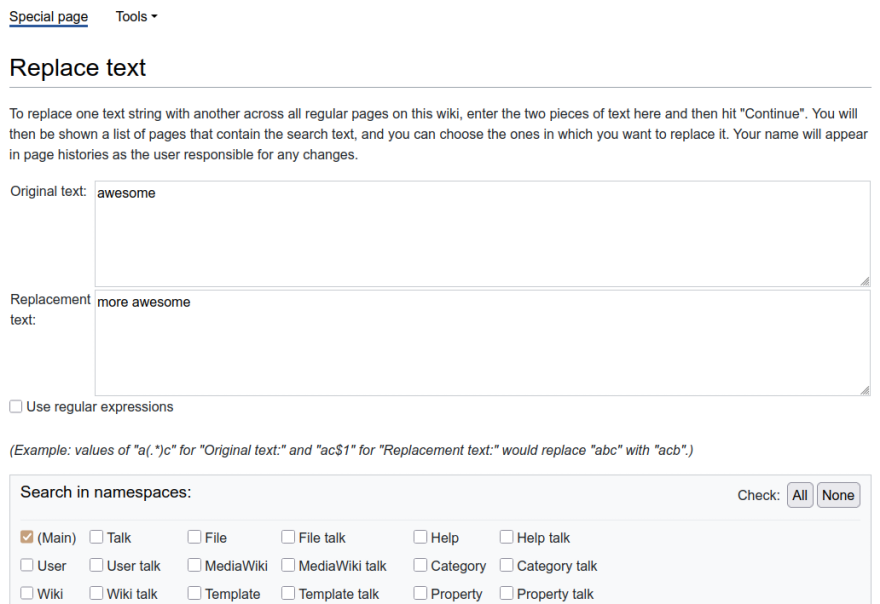
Replace Text is a valuable and easy-to-use tool for correcting common typographical errors or changing content on a larger scale, such as renaming categories and templates or updating template parameters and their values.
| Categories: Editing, Data management | |
| Bundled with MediaWiki | |
|---|---|
| Available in ProWiki | |
| Used by Wikimedia | |
#5: ParserFunctions
ParserFunctions adds logic and basic programming capabilities to wiki syntax. It lets power users directly employ conditional logic, do string manipulation, date and time handling, and mathematical calculations on wiki pages, preferably via templates. This extra set of parser functions makes your wiki content more dynamic without needing external scripts.
| Categories: Scripting | |
| Bundled with MediaWiki | |
|---|---|
| Available in ProWiki | |
| Used by Wikimedia | |
#4: Page Forms
Page Forms allows you to add, edit, and query data using forms. It is perfect for creating data-rich pages. When combined with Semantic MediaWiki, it simplifies the process of creating and maintaining data-driven pages.
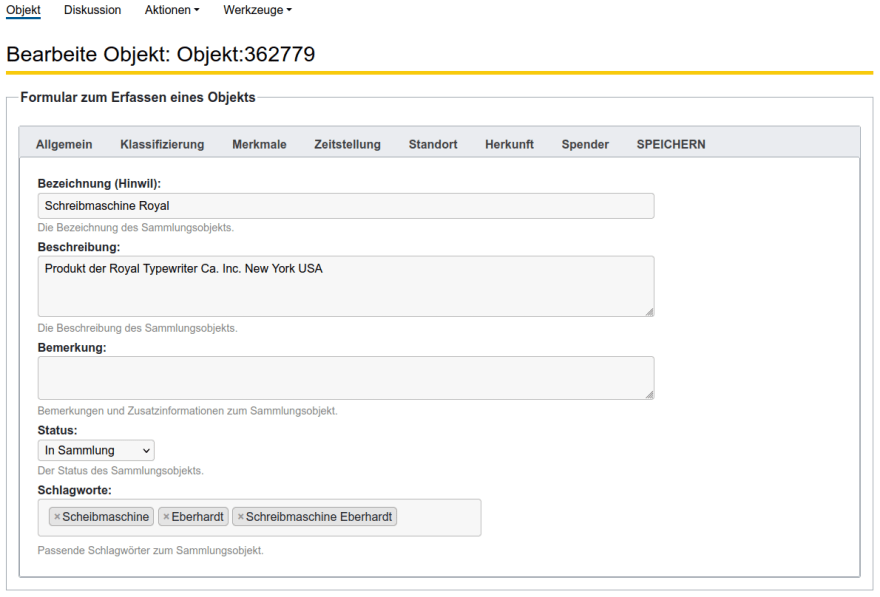
| Categories: User interface (UI), Editing, Data management | |
| Bundled with MediaWiki | |
|---|---|
| Available in ProWiki | |
| Used by Wikimedia | |
#3: Semantic MediaWiki
Semantic MediaWiki lets you add details to wiki pages to help the software interpret content—such as information about a person, project, or event. This way, plain text is supplemented with structured data that the wiki can search, organize, and display automatically in lists, tables, or summaries on specific topics. It also makes building reports, creating visualizations, or sharing your wiki’s data with other systems easy.
While setting up and using Semantic MediaWiki can be challenging initially, its long-term value more than makes up for the learning curve.
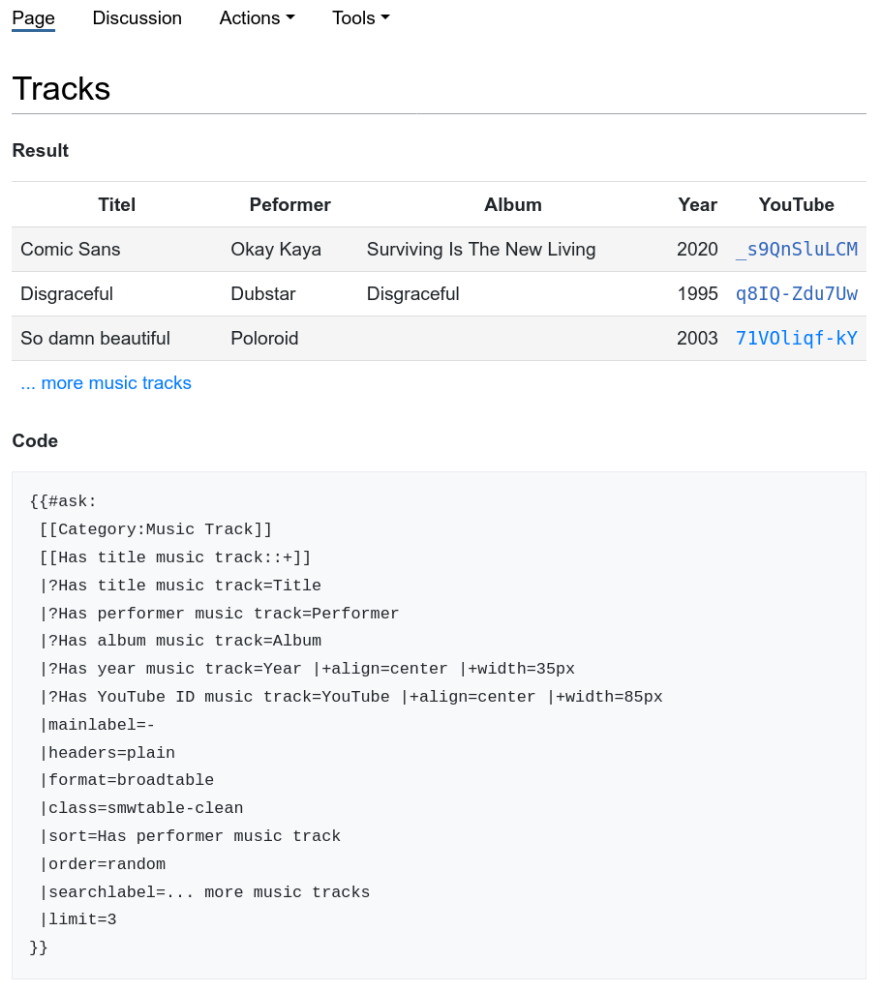
Semantic MediaWiki integrates perfectly with other recommended extensions, such as Data Transfer, External Data, and Page Forms, which are also mentioned in this blog post.
| Categories: Data management, Data visualization, User interface (UI) | |
| Bundled with MediaWiki | |
|---|---|
| Available in ProWiki | |
| Used by Wikimedia | |
#2: Visual Editor
The Visual Editor extension adds a solid and functional word processor–like interface for editing wiki pages. It includes a formatting toolbar, drag-and-drop content support, and a preview mode to show changes before saving. It is very easy to use, even for beginners without editing experience.
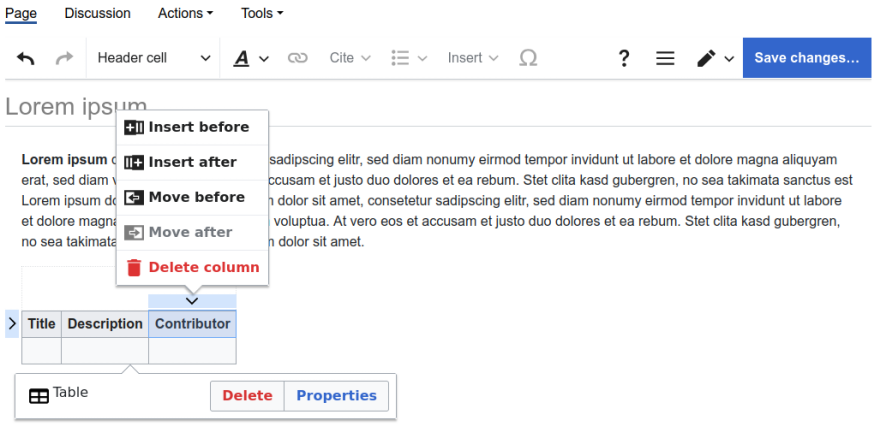
| Categories: User interface (UI), Editing | |
| Bundled with MediaWiki | |
|---|---|
| Available in ProWiki | |
| Used by Wikimedia | |
#1: ConfirmEdit
Preventing spam may not be glamorous, but it’s critical for wikis that allow public registration or open editing. Without protection, wikis become easy targets for bots—leading to spammed pages, mass account creation abuse, and time-consuming cleanup. In worst cases, search engines may even flag affected sites negatively.
ConfirmEdit offers several CAPTCHA options to reduce spam. We recommend the QuestyCaptcha module—it's simple to configure and highly effective.
| Categories: Spam prevention, Security | |
| Bundled with MediaWiki | |
|---|---|
| Available in ProWiki | |
| Used by Wikimedia | |
Conclusion
MediaWiki is solid on its own, but with the right extensions, it becomes a much more capable and user-friendly system for knowledge management or information sharing. Whether you need better editing tools, structured data management, or improved content handling, a well-working extension will likely do the job.
The list above covers some of the most useful and actively maintained extensions in 2025. Not all will apply to every wiki in your company, institution, or project, but many are great for building a flexible, maintainable wiki.
Did we miss your favourites, or you are using something not mentioned here? What MediaWiki extensions do you think are indispensable? Let us know by replying to one of our below-linked social media posts!
Further Resources
If you are installing new extensions yourself, check out our LocalSettings.php and Installing MediaWiki Extensions with Composer guides.
Need customization beyond what is offered by existing extensions? Commission expert MediaWiki developers to develop your own extensions. Check out our MediaWiki project portfolio.
Similar articles: Best MediaWiki Themes, Top Wikibase Extensions
See also: How to Install MediaWiki, Extensions Bundled with MediaWiki
MediaWiki hosting
ProWiki comes with many MediaWiki extensions. Some of those are enabled by default, while others can be enabled via one click in the MediaWiki admin panel.
Create your wiki instantly via ProWiki. Never worry about upgrades again. Get started immediately via the free trial, or contact us to migrate your existing wiki.